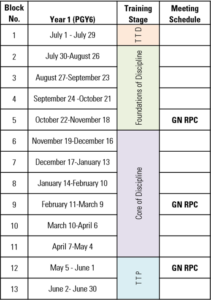Welcome
Welcome to the McMaster Adult Glomerulonephritis (GN) Fellowship Program.
The McMaster University Adult GN Fellowship Program is a learner-centred program with a strong emphasis on competency-based education.
The McMaster University Adult GN Fellowship Program has a strong emphasis on providing a comprehensive learning experience in order to achieve skills in all CanMEDS domains. The program is designed to be a one-year training program.
The curriculum is unique and aimed to provide exposure to all aspects of glomerulonephritis while allowing for flexibility and self-directed learning. The program is tailored to learner needs and therefore a variety of assessment methods are utilized in order to provide trainees feedback and guidance.
There is a dedicated and protected GN academic half-day led by faculty and presented in both lecture and case-based formats. The faculty are extremely motivated and oversee all aspects of education.
The academic program also has a strong clinical, basic science and medical education research component. There are numerous renowned faculty within the Division of Nephrology who lead major research projects and are leaders in their field. A strong research infrastructure to support trainees in pursuing either clinical, basic science, quality improvement or medical education research is provided.
Entry requirements
The GN fellowship program is designed for individuals who have graduated or will be graduating in the upcoming academic year from an Adult Nephrology residency program. For graduates from Canadian and foreign nephrology training programs, please provide the following:
- Curriculum Vitae (CV/Resume).
- Source of funding.
- Letter of interest indicating reasons for wishing to train at McMaster in Nephrology and how this fellowship training will meet your career goals.
Goals of Training
The McMaster University GN Fellowship program has as its core objective to graduate trainees who are practical and competent specialists in glomerulonephritis. There is a strong emphasis on acquiring knowledge in a contextual manner to help integrate and consolidate knowledge in developing competencies in glomerulonephritis-related problems and diagnostic procedures.
An outline of the phases of training is identified below:
Phase Map

Application deadline
For graduates from foreign Internal Medicine training programs, the deadline is December 1 prior to entry into the upcoming academic year which starts on July 1st.
Certification outcome
The successful completion of the GN fellowship will grant a McMaster University certificate in Glomerulonephritis.
Expandable List
- Training Stage TTD
- July 1 to July 29
- Training Stage Foundations of Discipline
- July 30 to August 26
- August 27 to September 23
- September 24 to October 21
- October 22 to November 18 (GN RPC Meeting)
- Training Stage Core of Discipline
- November 19 to December 16
- December 17 to January 13
- January 14 to February 10
- February 11 to March 9 (GN RPC Meeting)
- March 10 to April 6
- April 7 to May 4
- Training Stage TTP
- May 5 to June 1 (GN RPC Meeting)
- June 2 to June 30
Curriculum Highlights
Academic Curriculum
- Protected academic half days for GN fellows provided by faculty to trainees. The format is either lecture-based and/or case-based learning.
- Evidence-based Tuesday noon rounds (weekly).
- Nephrology Grand Rounds (weekly).
- Renal and GN Pathology Rounds (monthly).
- Research Rounds (every 2 weeks).
- Nephrology Journal Club (every 2 months).
- Visiting professor rounds (4 times/year).
- Quality Improvement and Patient Safety Rounds (every 3 months).
- Combined Medicine Subspecialty Rounds (every 3 months).
Procedure Based Curriculum
- Plasmapheresis.
Clinical and Contextual Learning Curriculum
- Longitudinal GN clinic.
- Genetics clinics.
- Lupus clinics.
- Renal, Respirology, and Rheumatology (RRR) clinics.
- Renal, Rheumatology, and Vasculitis (RRV) clinics.
Research Curriculum
The GN Fellowship program has a strong research infrastructure to support trainees in pursuing either clinical, basic science or medical education research. Numerous faculty members of the division have an interest in various aspects of glomerulonephritis including a special interest in vasculitis.
Additional information regarding the Division of Nephrology’s research productivity can be found on the Hamilton Centre for Kidney Research website.
Assessment
The McMaster Renal Transplant Fellowship Training program utilizes a variety of assessment tools to enhance our learners’ education in building competency. Some of the tools utilized for evaluation include:
- AFC milestones.
- ITAR.
- Procedures evaluations.
- Assessment of teaching by junior learners.
- Assessment by interprofessional.
